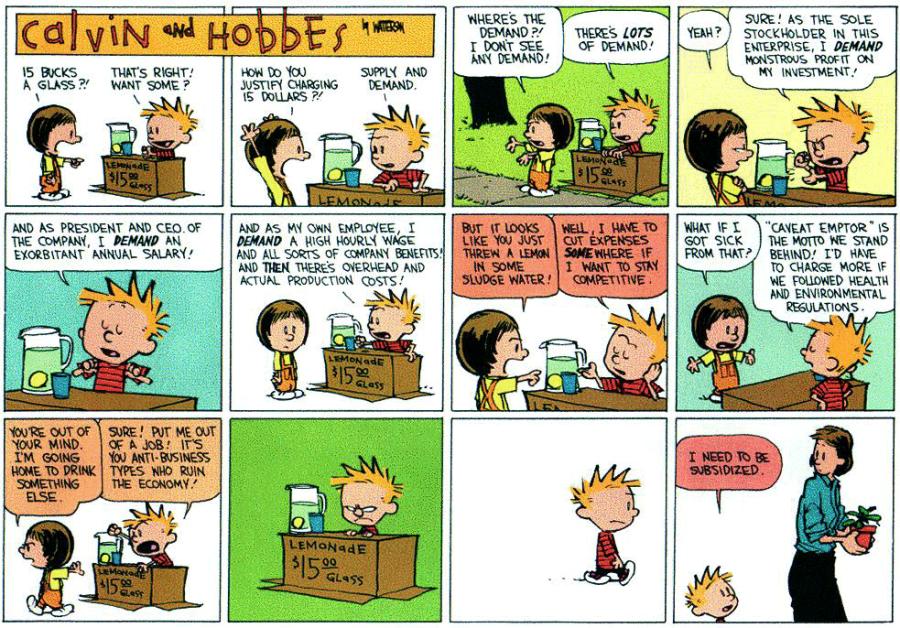
Against Monopoly
defending the right to innovate
Monopoly corrupts. Absolute monopoly corrupts absolutely.
Copyright Notice: We don't think much of copyright, so you can do what you want with the content on this blog. Of course we are hungry for publicity, so we would be pleased if you avoided plagiarism and gave us credit for what we have written. We encourage you not to impose copyright restrictions on your "derivative" works, but we won't try to stop you. For the legally or statist minded, you can consider yourself subject to a Creative Commons Attribution License.
current posts | more recent posts | earlier posts
Booklist
[Posted at 01/31/2009 11:01 AM by David K. Levine on Against Monopoly  comments(0)]
comments(0)]
More Jeffrey Tucker Live
I'm going to add a few comments of my own about copyright. There are basically four areas covered by copyright.
Entertainment: This is the tail that wags the dog. Not that entertainment isn't important; it is just that only a small subpart of the entertainment industry is covered by copyright. Let's call that the "professional entertainment" industry - popular fiction and non-fiction; movies; tv; professional music. The problem is that this industry is minuscule - smaller than just the IBM Corporation alone. Absent copyright, we'd lose some marginal contributions, and the very rich people at the top would be less rich. However, "professional entertainment" is tiny compared to "entertainment" which would include everything from home videos, to playing games, to talking on the phone with your friends. This industry is an order of magnitude bigger than "professional entertainment." And the main use of copyright in the "professional entertainment" industry is to limit competition from the "amateur entertainment" industry. Whatever we would lose from the professionals (not much, since copyright is de facto gone anyway) would be more than made up for by the amateurs.
Textbooks: Few people are educated by reading textbooks. If fewer text books are written without copyright (let's hope so since they are all the same) then the people who teach classes will have to do a better job; write more lecture notes; or create open source textbook - else we won't collect our pay as teachers. This industry is a sick joke: copyright is used so that teachers who are too lazy to develop their own material and don't pay for the texts themselves will assign bland overpriced texts to their captive students.
Scientific Research: Getting rid of copyright here would just accelerate the move towards open access scientific publications. If not for the fact that commercial publishers own the reputations of existing journals, they would be gone already. Scientific information is spread through the internet in preprints and working papers; publishing plays no role.
Software: This is an important industry. And one that can thrive without copyright as the example of open source/free software shows. Nor would the proprietary sector be driven out of existence - technical means of protection would still be available without copyright.
[Posted at 01/31/2009 10:46 AM by David K. Levine on Against IM  comments(0)]
comments(0)]
live blog 4
[Posted at 01/30/2009 09:12 AM by David K. Levine on Against IM  comments(0)]
comments(0)]
FreeTalkLive on Tucker, IP, and Boldrin & Levine
(Cross-posted on Mises Blog.)
[Posted at 01/28/2009 09:05 PM by Stephan Kinsella on Innovation  comments(0)]
comments(0)]
Newton's Fig
I cannot tell whether he is anti-IP or not, but he seems to be leaning that way.
[Posted at 01/28/2009 01:18 PM by Stephan Kinsella on Is IP Property  comments(5)]
comments(5)]
More from the trenches
"It's funny, I think back on it now -- the Apple II would turn out to be one of the most successful products of all time. But we had no copyrights or patents at all back then. No secrets. We were just showing it to everybody." (p.195)
Do we want people to make products or engage in legal shenanigans? Although who knows...maybe the legal minds invested in patent law would be out running Ponzi games if they weren't so busy figuring out how to steal other people's inventions.
[Posted at 01/28/2009 01:00 PM by David K. Levine on Innovation  comments(3)]
comments(3)]
PATENTING = INNOVATING
"International patent filings under WIPO's Patent Cooperation Treaty (PCT) grew by 2.4% in 2008, to nearly 164,000 1 applications. While the rate of growth was modest, as compared to an average 9.3% rate of growth in the previous three years, the total number of applications for 2008 represents the highest number of applications received under the PCT in a single year. Continued use of the PCT, a cornerstone of the international patent system, indicates that companies recognize the importance of sustained investment in research, development and innovation to remain competitive even within challenging economic conditions."
Interesting patent-lawyer spin, in the bolded words--i.e., PATENTING = INNOVATING.
[Posted at 01/28/2009 10:40 AM by Stephan Kinsella on Innovation  comments(0)]
comments(0)]
Say no to the merger of drug-makers Wyeth and Pfizer
[Posted at 01/28/2009 09:19 AM by John Bennett on Pharmaceutical Patents  comments(6)]
comments(6)]
Isle of Man a national Pirate Bay?
Short of getting rid of copyright on music, this compromise might not be bad, if the fee charged remains low. In fact the island's government could push the issue by imposing it and not preventing non-islanders from down-loading, creating a sort of national Pirate Bay. How long could the companies hold out?
[Posted at 01/28/2009 09:03 AM by John Bennett on Copyright  comments(2)]
comments(2)]
How firms really operate

[Posted at 01/27/2009 09:42 AM by John Bennett on Financial Crisis  comments(0)]
comments(0)]


Most Recent Comments